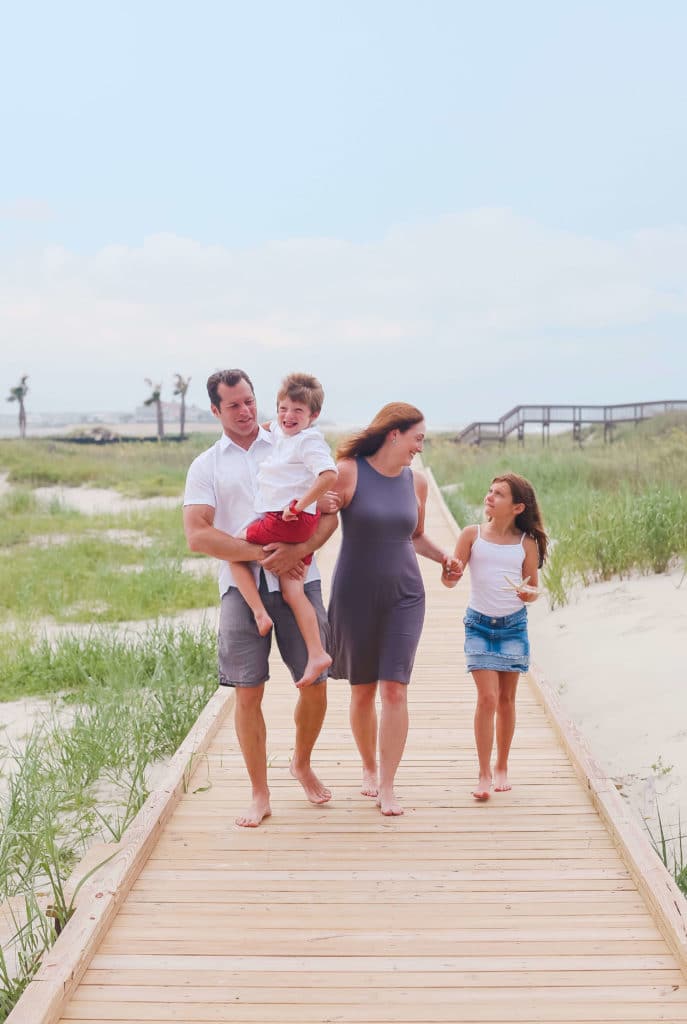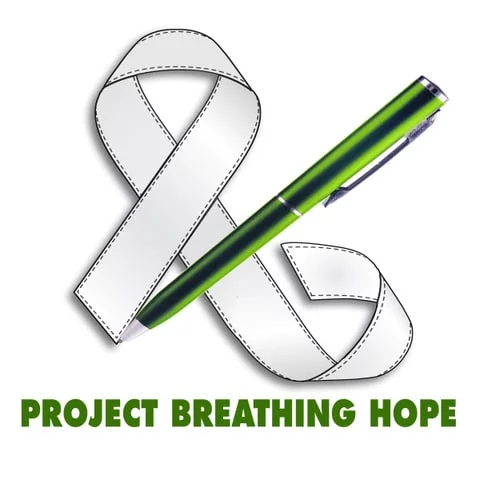
Jen's Story

It began with this one seemingly benign symptom…
In the winter of 2017, I developed a lingering cough that waxed and waned over a period of at least six months. Everyone attributed this mysterious cough to frequent viral infections — after all, I am the mother of two young children. Not that unusual, right?
I consulted with a doctor who assured me that it was just a cold or allergies. I was prescribed over-the-counter medications and sent on my way. The cough did seem to go away at times, but it always bounded back. Even multiple courses of antibiotics didn’t keep it at bay for long.
Still, I felt pretty good, overall. I had no other symptoms. And because the cough sometimes vanished, I didn’t suspect a serious health problem. I certainly didn’t suspect that there was a tumor lurking in my lung, waiting to wreak havoc on my life. Given my never smoker status and relatively young age of 44, lung cancer never crossed my mind.
But there was that one nagging symptom…
One day I was providing anesthesia during surgery for one of my ENT (ear, nose and throat) colleagues. We spent the entire day working together in the operating room. Apparently, I coughed most of the day because my colleague asked about the cough. How long had I had it? Did I have any other symptoms? He ordered a chest x-ray on the spot.
That was the day that changed my life forever. Like so many other cancer survivors, in a matter of moments, my life was divided into Before and After. It was the end of one life and the beginning of another.
The chest x-ray revealed a mass in my left lung — the lingula, to be precise. My colleague and I were both concerned. But at the same time, we were both confident that this mass wasn’t life-threatening. We were both doctors, after all. We knew that the odds were stacked against this mass being lung cancer. I mean, I was only 44-years-old! There were other more likely diagnoses, weren’t there? I was healthy and active, I had just returned from a family ski trip… surely, I couldn’t have lung cancer! We agreed that it was most likely an infection that would clear with a course of antibiotics.
But despite my brain telling me that an infection was the most likely scenario, my heart knew something wasn’t right. I requested a CAT scan right then and there.
The diagnosis? Metastatic EGFR-sensitizing non-small cell lung adenocarcinoma.
Stage IV.


I’m a doctor.
I knew what this diagnosis meant. I understood that, realistically, chronic disease and lifelong treatment would be my best case scenario. I knew that I needed to find a doctor who was willing to do absolutely everything possible to prolong my survival, treat this disease as aggressively as possible. And I needed to find him fast. I needed to be here for many years. I needed to raise my children.
For me, nothing else mattered except being alive. If my chances could at all be increased by having the primary tumor removed, that’s what I’d do. I’d fight for my life. And I needed a team of doctors who’d see my will to live and my strength and determination to fight and be willing to fight right alongside me.
After six months of treatment with Tagrisso (an EGFR inhibitor), all of my scans showed a significant reduction in tumor volume and activity. This, coupled with my otherwise good health, allowed me to take the next step: surgery to remove the lung tumor altogether. While this surgery was unconventional, my surgeon was so impressed by my response to Tagrisso and my good health that he agreed to operate. Surgeons traditionally do not operate on stage 4 patients so I am very fortunate that my oncologist was willing to refer me and my surgeon was not only agreeable but enthusiastic.
The good news is that, since the surgery, I’ve been NED (no evidence of disease), thanks to Tagrisso, and to the willingness of my oncologist and surgeon to think outside the box.
Living With It
A terminal lung cancer diagnosis profoundly changes your life. It puts everything into perspective the way little else can.
Did I mourn? Oh, yes. I swept through every possible stage of grief (shock, denial, guilt, anger, bargaining and depression). Then I started working through my feelings.
I’ve accepted my diagnosis now. And you know what? I’m actually hopeful about my future.
I don’t take anything for granted. I’m alive. And for that, I am so grateful. I’ve learned how to live my “new-normal” life.
The silver lining is that living with terminal lung cancer has forced me to stop and enjoy each moment and be grateful for every day that I’m here on earth with my husband and children. I’ve gotten better at living in the present. I am vividly aware of the joy in the little things. I’m more aware of everything around me. I focus on day-to-day living, and living each day to its fullest. I spend more time with my family, especially my young children.


But there are challenges
It is very difficult living your life with the knowledge that you have a terminal illness. And it’s difficult for your loved ones, as well. Trying to educate family and friends, while also staying strong for them on a daily basis, can be hard at times. It definitely takes an emotional toll.
And then, there’s the financial burden of treating stage four cancer. Cancer patients not only face daily reminders of their disease physically, emotionally and socially, but also financially.
Sure, I miss my old life; I worked hard to build it. I often daydream that this has all been a bad dream and I can return to my old life at will. But this new life of living with lung cancer doesn’t mesh with my old life. Too much stress in that old life of 50-hour workweeks and, often, too little sleep. The new me has to be zen and healthy and get plenty of sleep.
Still, I’ve received so much support. For example, I absolutely love my social worker at Dana-Farber. She’s available to me anytime, dispensing invaluable advice to my husband and me. I’ve had to deal with some mild anxiety about situations that never bothered me before. For instance, I find it rather difficult to be a passenger in a car or a plane. The loss of control and risk of something like a car accident taking my life even sooner is sometimes overwhelming.
And, of course, those of us living with cancer must learn to coexist with that ever-present fear of a cancer relapse.
In my case, the enemy is progression — eventually the tumor will mutate and find a way around the medication. Progression is inevitable and it is scary. One never knows when or in what way progression will present itself. Tagrisso, my first line treatment, tends to control the disease for, on average, about 18 months. Then, typically, progression occurs and we move into second line treatment, which, for me, will probably be some combination of medications that includes chemotherapy, or perhaps a clinical trial.
Unless there’s a medical breakthrough between now and then that steps in and alters my fate.
That brings us to the reason my husband and I established Project Breathing Hope. Perhaps you’re wondering what motivated me to share my experiences with lung cancer. Once I had exhausted all the stages of grief, I realized I had two choices: I could surrender and allow myself to keep spiraling down into a deep, dark hole of depression and hopelessness, or I could take positive, proactive steps that could hopefully make a difference for everyone who will suffer and die from this disease.
So I decided to make the unknown amount of time I have left as meaningful as possible. I’m hoping that sharing my story will help others who receive this devastating diagnosis feel that they are not alone. I’m also hoping to help raise public awareness for lung cancer, and to fundraise so that the brilliant scientists and researchers are able to find innovative treatment options that will improve the quality of life and overall survival rates for those living with the driver mutation EGFR.
If we want to be able to manage cancer the way we manage other unfortunate health conditions — as a chronic, treatable disease — I must do my part.
As a doctor, and now a patient, it is my belief in science and modern medicine that gives me hope. I remain optimistic that the hard work of brilliant scientists and medical researchers will lead to the discovery of effective, long-lasting treatments.
One obstacle hindering medical breakthroughs is that a lung cancer diagnosis is typically thought of as a death sentence, so too many people believe: Why bother?
I’ll tell you why: Because life is precious. Because lung cancer patients want to live, too. We deserve a fighting chance, too. We deserve to survive. We all have a life that we desperately want to live. And cutting-edge researchers are willing and able to find new treatment options that will increase survival rates and improve quality of life for lung cancer survivors. They just need the funding and public support to find those solutions.
Here’s the truest statistical reality: If you have lungs, you can get lung cancer.


But I urge you not to get bogged down in the statistics. When it comes to survival estimates, there’s a huge mismatch between population statistics and individual cases. Population statistics should only be used to help one make choices about the best treatment options. That doesn’t mean you should dwell on them. You must focus your energy on you, an N of 1.
If I could offer any advice for others who have been diagnosed with a so-called “terminal illness,” it’s this…
It’s okay to grieve for the life you had planned. But once you’ve mourned the loss of this life, you must move on. You must live the life in front of you to the fullest. Now, more than ever, there’s so much hope for the future. Please try to remember that, and let it motivate you to live each day to the fullest.
What We Can Do About It
Despite the fact that lung cancer is the leading cancer killer of both men and women in the U.S., this deadly disease doesn’t receive nearly enough attention and support.
We can raise awareness and research funding for lung cancer. We can keep pushing for medical breakthroughs until the overall long-term survival rates for lung cancer are on par with those of breast, colon and prostate cancers.
We can work to erase the “smoker’s disease” stigma associated with lung cancer, for stigma surely limits public awareness and lung cancer research funding, which ultimately undermines support for lung cancer sufferers and diminishes public will to eradicate it.


The burden and cost of lung cancer to society is too great. Certainly, the burden and cost to everyone who is currently battling lung cancer and those who will develop this devastating disease in the coming months and years is too great.
We must get better at screening, treating and preventing. We need earlier detection, we need the tools to cure, we need to increase survival for those living with this devastating disease. We must fund research that ultimately turns this terminal disease into a chronic and manageable one. We must Rewrite the Future of Lung Cancer.
If you’re inspired to get involved in promoting lung cancer awareness and research, I hope you’ll visit our Get Involved page for ideas on how you can help.
REFERENCES
The American Cancer Society (ACS)
www.cancer.org
The Bonnie J Addario Lung Cancer Foundation (ALCF) www.lungcancerfoundation.org
The Lung Cancer Foundation of America (LCFA)
Lcfamerica.org
Lung Cancer Alliance, 1747 Pennsylvania Avenue NW, Washington, DC 20006 www.lungcanceralliance.org
